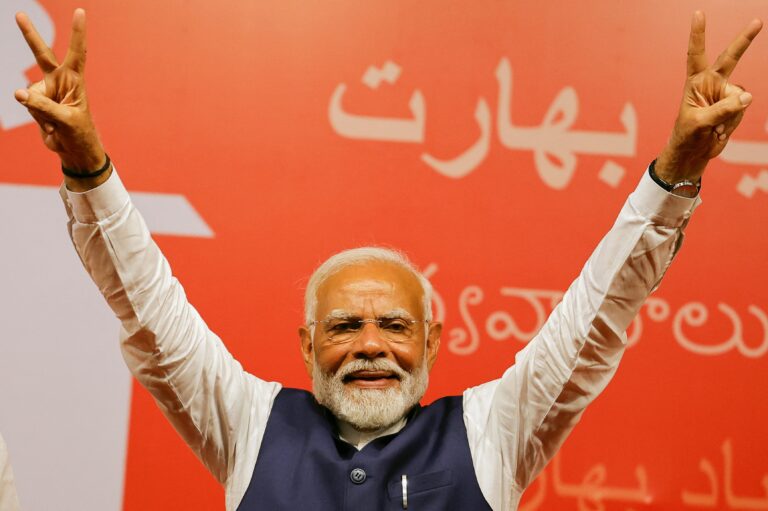Indian Prime Minister Narendra Modi gestures at the Bharatiya Janata Party (BJP) headquarters in New Delhi, India, June 4, 2024.
Adnan Abidi | Reuters
Over the past few years, chief executives of major U.S. companies have set their sights on the Indian market and have invested time and money in building relationships with Prime Minister Modi.
GE Aerospace, Apple, Starbucks and Nvidia are among the companies that have signed high-profile deals to expand manufacturing and sales in India.
“As China’s growth slows, India has become a go-to destination for US tech giants,” Pramit Chaudhuri, Eurasia’s head of South Asia, told CNBC on Tuesday.
Indian stock markets sold off on Monday following the unexpected election result, dropping by the most since 2021.
The results are “definitely a negative that will likely weigh on the market in the near term,” said Rahul Sharma, emerging markets portfolio manager at Schaefer Cullen & Co., an investment firm with $6 billion under management.
But Sharma remains bullish on India in the long term, citing its demographic strength.
“We must not forget the enormous potential of this country, which has major advantages such as per capita income still at a low level and a large, young and relatively well-educated workforce,” Sharma said.
Modi’s failure to secure a supermajority for his party also raises new questions about his government’s broader economic policies.
Specifically, whether the promised reforms will be passed swiftly, as Modi promised during the election campaign.
“Coalition governments always face challenges, especially when it comes to formulating economic plans,” the Asia Society’s India team wrote in a client note.
“Most of the economic reforms will require Indian leaders to persuade, negotiate and cooperate with opponents, which can mean things take time to get done,” said a former government official who spoke to CNBC on the condition of anonymity to discuss private conversations.
The question is whether Modi can pivot from governing as a super-majority leader to governing as a consensus builder.
Modi’s goal is to make India the world’s third-largest economy by 2027. India is currently the world’s fifth-largest economy and grew 8.2 percent in the fiscal year that ended in March.
But India’s astounding GDP last year hides high unemployment that is shattering the career prospects of young workers and driving millions out of cities and back to rural areas.
“The unemployment situation in the country has definitely led to an intensification of the election campaign,” Eurasia’s Chaudhuri said.
“Lack of employment is the No. 1 concern of voters. [the] “The labor market recovery is not yet widespread,” analysts at TS Lombard wrote in a client note on Tuesday.
Now, one of the labour laws that Modi’s government wanted to reform may not be implemented because his party, the Bharatiya Janata Party (BJP), no longer has a majority in Parliament.
Modi’s proposed reforms would simplify laws on hiring and firing workers and remove other barriers to a more flexible labor market.
Other analysts have said key reforms related to agriculture and land acquisition may also take longer to implement than previously expected. Infrastructure projects should continue, but as in other areas, the pace may be slow.
In the short term, the new governing dynamics of the Indian parliament may require a re-setting of corporate expectations in the U.S. Some reforms may take longer under a coalition government.
But experts say U.S. companies still see India as central to their long-term strategy to diversify their manufacturing and supply chains rather than solely relying on China.
“I don’t think US companies’ entry into India will be affected. [by the election results]Raghuram Rajan, former governor of the Reserve Bank of India, said:
He added that investment from the U.S. “has not come because of reforms that have had an impact on investment.” Rajan is currently a finance professor at the University of Chicago Booth School of Business.
Sharma of Schaefer Cullen predicted that the BJP’s “aggressive Hindu nationalist” rhetoric would soften after the election, “leading to less division and tensions within the country.”
Indian leaders have faced criticism over their treatment of minorities, including Sikhs and Muslims, and over their government’s efforts to silence political opponents.
Supporters of the ruling Bharatiya Janata Party (BJP) hold up a cutout of Indian Prime Minister Narendra Modi during an election rally in Amritsar on May 30, 2024.
Narinder Nanu | Editorial photo via Getty Images
“If the election results dissuade the BJP from pursuing a hardline Hindu nationalist agenda, it could put India in a more socially secure position,” Tom Miller, an analyst at Gavekal Research, wrote on Wednesday.
Once the new government is in place, the next big event will likely be the announcement of the annual budget on July 1, said Jitania Kandhari, head of macroeconomic research for Morgan Stanley’s emerging markets equity team.
“This will determine the new administration’s stance and response (in terms of spending priorities),” Kandhari said in an email to CNBC.

